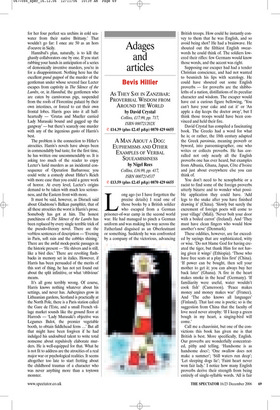Lecter falling flat
Philip Hensher
HANNIBAL RISING by Thomas Harris Heinemann, £17.99, pp. 336, ISBN 0434014087 ✆ £14.39 (plus £2.45 p&p) 0870 429 6655 Hannibal Lecter is, surely, a fictional character who needs no introduction. It’s one of the grosser stupidities of this almost limitlessly stupid novel to think that those readers who have enjoyed the grand guignol of Thomas Harris’s other Lecter novels, Red Dragon, The Silence of the Lambs, and Hannibal would welcome an account, even an explanation of his hero’s habits. In theory, one ought to be curious how it is that someone ends up thinking it quite entertaining to cut slices off a human brain (for instance) and sauté them at table before sharing the dish with his girlfriend and the still living vic tim. In practice, one doesn’t give a toss. Lecter’s an aesthete/psychopath. Who cares how he got that way? This is rather like reading the school reports of Ernst Stavro Blofeld.
Anyway, this account of Hannibal Lecter’s childhood and youth reveals him to have been seared irreparably by the experience of the second world war. He is born the scion of an ancient aristocratic Lithuanian house. His mother (‘of the Sforza on one side and a Visconti on the other’) is burnt alive, his infant sister Mischa (surely a boy’s name in Russian?) is killed and eaten by Nazi collaborators. Hannibal himself survives, but ends up, implausibly, in the family castle, now a Soviet orphanage. Even less plausibly, his uncle, Count Lecter, is permitted to take him back to Paris, where he lives with a Japanese noblewoman, Lady Murasaki (or ‘the Lady Murasaki’) in considerable splendour.
Lady Murasaki is an aesthete of a peculiarly annoying fictional type, forever twanging away or writing haikus, taking long, blossom-strewn baths or enjoying the apparently exquisite odours of burnt bark on a mica chip (I’m not convinced). Such pretelevision forms of entertainment naturally allure the young Lecter into overwritten reveries — ‘Hannibal walked Lady Murasaki to her very chamber door’. Harris, I must say, seems rather vague about her abstruse pleasures: ‘Lady Murasaki’s poissonnier had for her four perfect sea urchins in cold seawater from their native Brittany.’ That wouldn’t go far: I once ate 50 as an hors d’oeuvre in Sicily.
Hannibal’s plan, naturally, is to kill the ghastly collaborators one by one. If you start rubbing your hands in anticipation of a series of demonically inventive murders, you’re in for a disappointment. Nothing here has the excellent grand guignol of the murder of the gentleman under whose severed face Lecter escapes from captivity in The Silence of the Lambs, or, in Hannibal, the gentlemen who are eaten by carnivorous pigs, suspended from the roofs of Florentine palazzi by their own intestines, or forced to eat their own frontal lobes. Harris goes into it all halfheartedly — ‘Grutas and Mueller carried Lady Murasaki bound and gagged up the gangway’ — but there’s scarcely one murder with any of the ingenious gusto of Harris’s best.
The problem is the connection to Hitler’s atrocities. Harris’s novels have always been in commendably bad taste; for the first time, he has written one uncommendably so. It is asking too much of the reader to enjoy Lecter’s lurid murders as an incidental consequence of Operation Barbarossa; you could write a comedy about Hitler’s Reich with more ease than you could a genre work of horror. At every level, Lecter’s origins demand to be taken with much less seriousness, and the Eastern front with more.
It must be said, however, as Disraeli said about Gladstone’s Balkan pamphlet, that of all these atrocities the worst is Harris’s prose. Somebody has got at him. The honest punchiness of The Silence of the Lambs has been replaced by every single terrible trick of the pseudo-literary novel. There are the verbless sentences of description — ‘Evening in Paris, soft rain and the cobbles shining.’ There are the awful mock-poetic passages in the historic present — ‘He shivers and is still, like a bird dies.’ There are revolting flashbacks in memory set in italics. However, if Harris has been persuaded of the merits of this sort of thing, he has not yet found out about the split infinitive, or what ‘oblivious’ means.
It’s all gone terribly wrong. Of course, Harris knows nothing whatever about his settings, and never has. Aubergines grow in Lithuanian gardens, Scotland is practically at the North Pole, there is a Paris station called the Gare de l’Este, and a small French village market sounds like the ground floor at Harrods — ‘Lady Murasaki’s objective was Legumes Bulot, the premier vegetable booth, to obtain fiddlehead ferns ...’ But all that might have been forgiven if he had indulged his undoubted talent to write total nonsense about repulsively elaborate murders. He is well-equipped for that. What he is not fit to address are the atrocities of a real major war or psychological realities. It seems altogether too late to start fretting about the childhood traumas of a character who was never anything more than a toytown monster.







































































































































 Previous page
Previous page